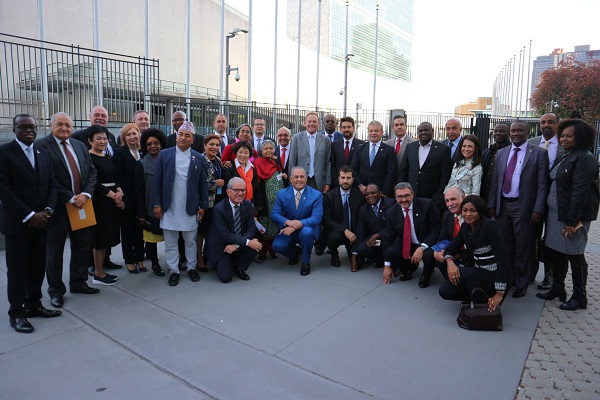New York, 26 April, 2018 - Members of Parliament (MPs) from 32 countries, representing all regions of the world, showed overwhelming engagement for the UN High-Level Meeting (HLM) on TB and support to the ‘Key Asks from TB Stakeholders and Communities` during a two-day consultation held in New York on 25-26 April 2018.
The distinguished group of MPs led by the Global TB Caucus are urging their Heads of State to attend the UN General Assembly HLM on September 26 and make meaningful and concrete commitments to end TB. The parliamentarians were joined by the Stop TB Partnership, the President of the General Assembly, UN Missions in New York, the World Health Organization (WHO), The Global Fund to Fight AIDS, Tuberculosis and Malaria, representatives of TB survivors and communities, the private sector, researchers and technical partners.
The TB Key Asks (download here) were developed over several months of discussions and consultations with the TB community at large and most stakeholders and partners. The Key Asks include priority targets under the five key themes:
1. Reach all people by closing the gaps on TB diagnosis, treatment and prevention;
2. Transform the TB response to be equitable, rights-based, and people-centered;
3. Accelerate development of essential new tools to end TB;
4. Invest the funds necessary to end TB;
5. Commit to decisive and accountable global leadership, including regular UN reporting and review.
"It is truly encouraging that we see the momentum already building up by parliamentarian leaders whose role is critical to ending TB," said H.E. Mr. Koro Bessho, Permanent Representative of Japan to the United Nations. Japan and Antigua & Barbuda are the co-facilitators for the UN HLM on TB. "Any disease that claims the lives of millions of people deserves immediate global attention," said Dr. Aubrey Webson, Permanent Representative of Antigua and Barbuda to the United Nations.
Dr. Lucica Ditiu, Executive Director of the Stop TB Partnership, highlighted that the Key Asks are the result of months of discussions and preparations with representatives across all TB stakeholders and the community at large. "I’m grateful we are united and clear on what we would like to see as the outcome of the UNHLM. The time is now to step up our efforts in every single country, reach out to our leaders, partners, people and communities and ensure that on 26 September we have the historical HLM on TB that we all call for," said Dr. Ditiu.
Speaking on occasion, Minister Miroslav Lajcák, President of the UN General Assembly said that the "UN HLM on TB must not be just another meeting. It must press for bold commitments, bringing together the voices of champions, affected communities & survivors."
In his welcome address, the Rt Hon Nick Herbert CBE MP from the United Kingdom, who co-chairs the Global TB Caucus along with South Africa’s Minister of Health and Chair of the Stop TB Partnership, Hon Aaron Motsolaedi, said that the "HLM is a unique opportunity to raise the profile of TB which until now simply hasn’t commanded adequate attention from global leaders," emphasizing that "TB needs this focus at the top level - it’s the world’s deadliest infectious disease, killing more people every year than AIDS and malaria combined. Action to tackle this global catastrophe is long overdue."
The Global TB Caucus members endorsed the headline Key Asks, urging world leaders to use the HLM on TB to commit to a renewed effort to prevent, diagnose and treat TB a cumulative 40 million people by 2022 through both public and private sector health services, including 3.5 million children and 1.5 million people with drug-resistant TB.
A briefing for UN Missions took place on Thursday, 26 April evening in UN Headquarters under the theme "The Human Faces of TB," where a group of passionate TB advocates from Tajikistan, Kenya, Peru, and the United States shared their personal stories with UN Ambassadors and Parliamentarians and called on the delegates to take ambitious actions to put the world on course to ending TB.
Ending the TB epidemic by 2030 is a target of the UN’s Sustainable Development Goal (SDG) 3: "Ensure healthy lives and promote well-being for all at all ages." Unless world leaders agree on urgent actions to accelerate the current rate of progress against TB, the SDG target could be missed by more than 160 years at the cost of over a trillion dollars in lost economic output and countless millions of lives.
